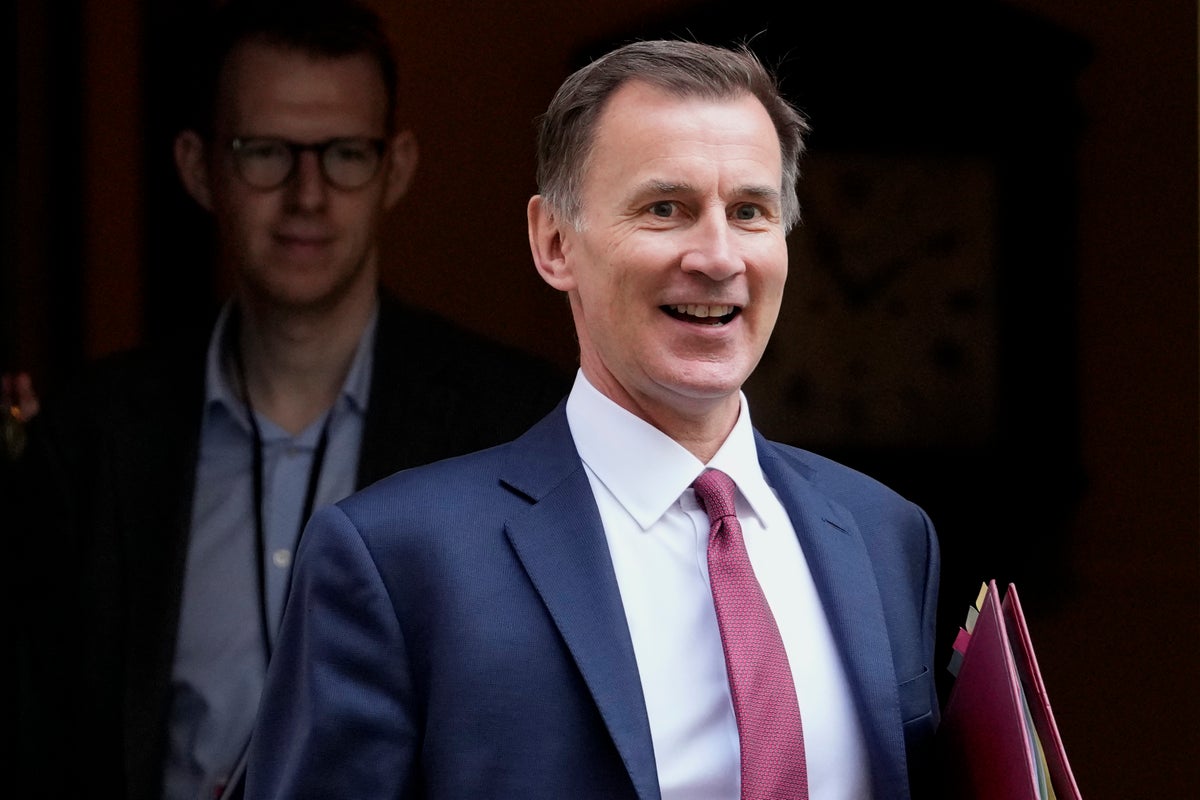
The UK economy shrank surprisingly sharply in July, as retailers and construction projects were knocked by wet weather, sparking fresh fears of a recession.
Experts had forecast a 0.2 per cent decline in gross domestic product (GDP), but official data shows it contracted by 0.5 per cent. The bigger-than-expected slump came after 0.5 per cent growth in June.
Economists said that Britain was “walking a tightrope” after the shock setback – with some saying a recession may have already begun.
Paul Dales, chief UK economist at Capital, said a mild recession may have already begun, with July’s decline suggesting that “underlying growth has lost momentum since earlier in the year”.
James Smith, developed markets economist at ING, said a recession – which means two consecutive quarters of decline – “can’t be ruled out”. He added: “We think the economy is likely to more or less flatline over coming quarters.”
Labour said it was another “dismal day” for the economy, but chancellor Jeremy Hunt insisted that there were “reasons to be confident” about the future.
The chancellor said: “We were among the fastest in the G7 to recover from the pandemic and the IMF have said we will grow faster than Germany, France, and Italy in the long term.”
Economists pointed out that weak GDP growth in the third quarter is now likely to fall short of the Bank of England’s +0.4 per cent forecast.
But most still expect the push to curb inflation will mean governor Andrew Bailey and the monetary policy committee at the central bank will hike interest rates one final time – from 5.25 to 5.5 per cent – next week.
Retail was hit by unseasonably wet weather in July, affecting GDP— (PA)
Labour’s Rachel Reeves, shadow chancellor, said: “Today is another dismal day for growth, and the British economy remains hostage to the Conservatives’ low growth trap that is leaving working people worse off.”
The Liberal Democrats’ Treasury spokesperson Sarah Olney said Tory “mismanagement” of the economy was now a “burden on any chance of growth”, adding: “Rishi Sunak has utterly failed to get a grip on the cost of living crisis.”
Darren Morgan, ONS director of economic statistics, said “the broader picture looks more positive,” despite the fall in GDP, with the economy growing across the services, production and construction sectors in the last three months.
Senior Labour MP Wes Streeting accused the Tory government of being “penny wise, pound foolish” by failing to resolve strike action affecting the NHS. It came after the ONS reported that industrial action had been a factor in the economy contracting in July.
Rishi Sunak and Jeremy Hunt are said to be considering real-terms benefits cuts— (Downing Street)
No 10 urged people to focus on broader growth figures rather than the “monthly snapshot” which showed an economic contraction. “The broader picture is more positive over the past three months,” said Mr Sunak’s official spokesman.
Business secretary Kemi Badenoch insisted the plan was working. “I would say that is stable rather than it not being something that is growing,” she said when asked about the figures over the last two months.
The Federation of Small Businesses called on Mr Hunt to “lighten the burden of business rates” at the Budget after the “disheartening” GDP slump.
Mr Hunt remains under pressure from Tory MPs to cut taxes in a bid to boost growth. But the chancellor is reportedly considering making real-terms cuts to benefits to make space for pre-election tax cuts.
It comes as Mr Sunak and Mr Hunt mull a “tweak” to the triple lock to limit costs, meaning pensioners may not get a bumper 8.5 per cent increase in the state pension.
Under the triple lock – which guarantees an increase in line with average earnings, inflation or 2.5 per cent, whichever is highest – pensioners would have been in line for a rise linked to wages from April.
But ministers are considering whether to strip out the impact of public sector bonuses on the earnings figure, which could mean an increase of around 7.8 per cent instead.
Mr Sunak told the Commons on Wednesday that he remains committed to the triple lock on state pensions – although he swerved calls to guarantee it will feature in the next Tory manifesto.
“There is one party in this House that has always stood up for our pensioners and that is the Conservative Party,” the PM said at PMQs.
Earlier this week work and pensions secretary Mel Stride stressed the need for any pension increases to take into account “affordability and the position of the economy”.
The cabinet minister admitted to ITV News that the triple lock pension promise is not sustainable, saying: “It seems to me that it does become unsustainable in the long-term.”







